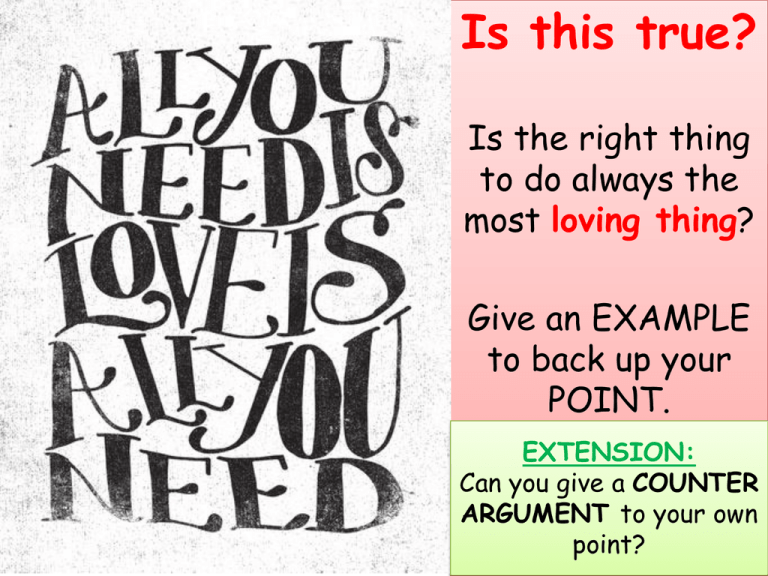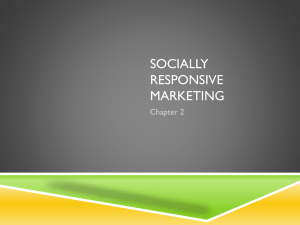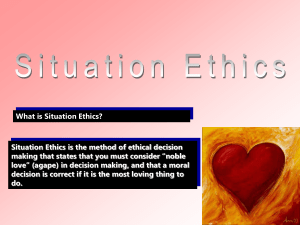Lesson 3 – Situation Ethics
advertisement

Is this true? Is the right thing to do always the most loving thing? Give an EXAMPLE to back up your POINT. EXTENSION: Can you give a COUNTER ARGUMENT to your own point? Joseph Fletcher American Christian Minister To use memory recall, exam questions, a real life scenario, and biblical quotes to understand the Christian principle of Situation Ethics Grade C All will be able to use memory recall to define and describe what is meant by Situation Ethics. Grade B Most will be able to explain the concept of agape and apply the principle of Situation Ethics to making moral decisions. Grade A/A* Some will be able to evaluate and express an opinion on the principle of Situation Ethics. Finish the following sentence LOVE IS... In English we only have ONE word for LOVE that is often understood to mean romantic love. In Greek they have FOUR words for LOVE... EROS – Passion, desire, romantic love. STORGE – Love for your family. PHILIA – Love for your friends. AGAPE – The greatest love. What do you think is meant by the ‘greatest love’? Unconditional love- loving others as we love ourselves, both friend and enemy. To get to that grade B: Can you give at least one EXAMPLE of AGAPE? Grade B Most will be able to explain the concept of agape. The principle of Situation Ethics uses love (agape) as a basis for all moral decisions. Listen and watch the following slides carefully... You will be expected to use your MEMORY to DEFINE and DESCRIBE what SITUATION ETHICS is. Situation Ethics is a CHRISTIAN approach to making moral decisions. It was put forwards by JOSEPH FLETCHER a Christian Minister in the 1960’s during a time of great social change. Love should be the only consideration when making a moral decision. A GOOD decision is one that aims to do THE MOST LOVING THING. The simple teachings of JESUS... My command is this: love each other as I have loved you (John 12:15) A person should only obey the Bible and the Church if that teaching results in the MOST LOVING thing to do. Fletcher was clear about what type of love that should be applied – AGAPE (an attitude towards people rather than a feeling). Showing AGAPE makes it possible to love your enemies and act in loving ways towards people who have not done anything to deserve love. From memory complete the following on your worksheet... WHAT? WHO? HE SAID...? Complete PAGE 56 QUESTION 1 of your REVISION WORKBOOK complete WITHOUT NOTES against the 2 minute clock. Make a note of your time in the margin. EXTENSION: Also complete question 2 within the 2 minute time limit Now SELF MARK your work. REMEMBER 2 MARKS for an accurate definition 1 MARK partially correct definition Situation Ethics – The idea that Christians should base moral decisions on what is the most loving thing to do. 0 MARKS incorrect The Golden Rule– The teaching of Jesus that you should treat others as you would like them to treat you. Grade C All will be able to use memory recall to define and describe what is meant by Situation Ethics There are several verses in the New Testament that stress the importance of love (agape) in making moral decisions... ‘Love your God with all your heart, and all your soul...and love your neighbour as yourself’ (Luke 10:27) ‘Greater love has no man than this, that a man lay down his life for his friends’(John 15:13) ‘And this is his commandment, that we should believe in the name of his Son Jesus Christ and love one another, just as he has commanded us’ (John 3:23) Read the following scenario carefully… Using the above quotes and the principle of Situation Ethics (AGAPE) what do you think a Christian (who ONLY USES SITUATION ETHICS to make moral decisions) would do? Grade B Most will be able to apply the principle of Situation Ethics to making moral decisions. During the Holocaust, a group of Jewish people hid in the sewers of a German city as the SS police marched in the streets overhead. Amongst the group there was a mother with her baby. The woman’s baby began to cry. No matter what she did, the mother could not get her baby to stop. If the baby continued to cry , it was only a matter of time before the Nazis heard, and then they would all be discovered. Rather than risk the lives of everyone down there, she smothered her baby to death with a blanket, and let the corpse float down the sewer. This was taken from the memoirs of a Holocaust survivor who detailed how she escaped Nazi imprisonment. Did the woman's actions follow the principle of Situation Ethics? Was this the most loving action? EXTENSION: Do you think that morally, this was the right course of action? Grade A/A* Some will be able to express an opinion on the principle of Situation Ethics. Complete the following... YES YES Every situation is judged individually rather than a blanket right or wrong e.g. murder is wrong. NO NO It is dependant on a person being able to predict what will happen to determine what is most loving, and this is impossible. It has a genuine Christian intention, of In theory, anything (murder, adultery which the what basis isyou LOVE. etc...) could situation be justified ethics if the person Use have learnt today about to felt it was the most loving thing to do. EVALUATE whether you think it works as a moral code. Acting out of LOVE is a positive thing, so It works in extreme cases but not in it wouldOnce bring positive consequences. we are used to you have some ideaseveryday sharesociety with where a partner. having rules and laws. Complete PAGE 56 QUESTION 3 of your REVISION WORKBOOK PLEASE CHANGE ‘the Golden Rule today TO ‘Situation Ethics’ So the question reads… Do you think it is always possible to apply Situation Ethics? complete WITHOUT NOTES against the 4 minute clock. http://www.online-stopwatch.com/ Make a note of your time in the margin. Now SWAP and PEER MARK each others work. REMEMBER mark on those P’s and E’s and KW’s and Q’s. Give them a mark out of 4 and a clear TARGET. Grade A/A* Some will be able to evaluate and express an opinion on the principle of Situation Ethics. How would Situation Ethics be used to solve the following dilemmas? 1. A 15-year-old girl is pregnant after being raped, and is considering abortion. 2. A terminally ill man asks his wife to help him commit suicide. 3. A man is considering committing adultery on his wife who has Alzheimer's and cannot remember him.










